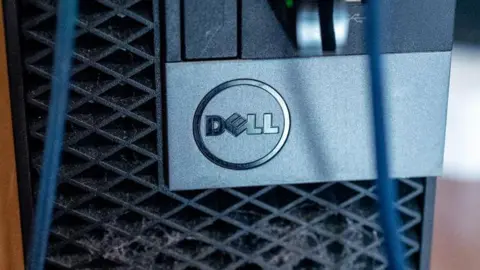By Mary Lou Costa, Economic journalist
 Hannu Rauma
Hannu RaumaWith the stress of managing 83 employees, Hannu Rauma felt discouraged and frustrated.
“I was too bogged down in all these problems that were happening within the teams, and I was disappointed,” says Mr. Rauma, who lives in Vancouver, Canada.
He is a senior executive at a company called Student Marketing Agency, which employs university students to provide marketing support to small businesses.
“When I was taking on new clients, half of my mind was thinking, ‘We’re going to screw this up,’ and that dampened my enthusiasm.”
But Mr Rauma says that all changed since last November, when the company began using an autonomous AI manager developed by US company Inspira.
The AI Manager helps agency employees, who work remotely on flexible schedules, set their schedules and plan their workload in advance.
The AI checks their punctuality, sends them regular due date reminders and check-in messages, and records time spent on different clients so they can be billed accurately. The AI also makes suggestions for improving the wording of written texts, is available to answer work-related questions, and automatically updates everyone’s work progress in a central portal.
Mr. Rauma says that switching to an AI manager has not only reduced his stress levels, but has also allowed his employees to work faster and be more productive. “I can focus on growing the business and all the positive aspects. It’s saved me years of life, I’m sure,” he says.
Mr. Rauma adds that his relationships with his colleagues have also improved considerably. “Before, it was more of a father-child relationship. Now we are more on an equal footing. Before, it was just about solving problems. But now we can have lighter discussions.”
But not everyone at Student Marketing Agency is using the AI manager yet. Mr. Rauma and 26 of his 83 employees were actually part of a study conducted by Inspira and academics from Columbia University, Arizona State University and the University of Wisconsin to compare the performance of the AI manager with its human counterparts.
Participants were divided into three groups: one group coached by a human manager, another by the AI manager, and the last group by both the AI and the human manager.
The AI manager achieved a 44% success rate in prompting employees to plan their workdays in advance and was able to motivate employees to log in on time 42% of the time. These numbers are comparable to the human manager, who scored 45% and 44% in these two areas.
Yet when the AI manager worked in partnership with a human manager, together they achieved a 72% success rate in getting employees to plan their workdays in advance and managed to achieve 46% success in punctuality.
Although the study is statistically small and focuses on a specific type of worker and field, its results suggest interesting implications for companies introducing AI tools.
 Getty Images
Getty ImagesWhile companies like UPS, Klarna, Dell and others have announced major job cuts this year, with plans to replace many roles with AI. Professor Paul Thurman of Columbia University in New York argues that replacing management roles entirely with AI would be a mistake.
“The middle management layer is the most critical in any organization,” the management professor explains. “That’s the layer that, if it starts to change, will lead you to a difficult situation. Your employees don’t see continuity, they don’t get mentoring and coaching… all these human things that human managers are better at than AI and should be focusing on.”
According to Professor Thurman, AI can free managers from constant reminders and checks, allowing them to focus on more innovative ways of working. For example, managers can select project teams based on individual skills, oversee the briefing, and then have their AI handle details like deadlines.
AI can also identify team members who are lagging behind and may need to be managed more closely by a human, and in turn, focus on the best performers who need extra recognition.
But companies should avoid letting AI managers become a surveillance tool, he says.
“You don’t want to get to the point where you realize that not only are people not showing up on time, but they’re taking too long at lunch and not eating enough salad. You don’t want to go that far,” says Thurman. “You have to find the right way to encourage the right behaviors.”
AI managers can also help people who have become “accidental managers” – people who excel in their role and end up managing people as a result, even if management is not a natural skill for them, says Tina Rahman, founder of London-based HR consultancy HR Habitat.
“We did a study on why people leave their jobs. Almost 100% of the people surveyed said it was because of poor management.
“Some of them said they didn’t like the way they were managed, and most of them also said it was because they didn’t know what was expected of them or whether they were doing a good job,” Rahman said.
“You would think that an AI manager would be designed to give appropriate instructions, to provide complete transparency about requirements and outcomes. People are likely to be more productive when they know what is expected of them.”
But an overreliance on AI management sets the tone that companies only care about results and not people, Rahman warns.
“It’s going to be very difficult for a company to tell its employees that it’s putting in place this brand new AI system that’s going to completely manage them, and then say, with the same face, ‘we care about your workplace experiences,’” she says.
 James Bore
James BoreBut the biggest concern for AI leaders may not be human, but cyber, warns James Bore, managing director of cybersecurity consultancy Bores, a speaker and author.
“If you have an AI leader and you’ve given them all the processes, procedures and intellectual property of the company that’s suddenly all in the software, it could be hijacked by someone who wants to clone it, and it could also be held for ransom,” Bore says.
“If you come to rely on that, which is what companies will do when they start replacing humans with AI, you’re kind of stuck because you have no resilience, no option to go back to humans because you don’t have them anymore.”
Rather than making businesses more efficient through extensive use of AI, Bore believes there could be an unintended consequence beyond becoming reliant on systems that are prone to failure.
“The more you automate and the more people you eliminate from your business, the more you reduce costs. But you also make your business more easily replaceable.”



